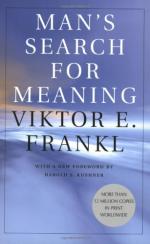
|
| Name: _________________________ | Period: ___________________ |
This test consists of 15 multiple choice questions and 5 short answer questions.
Multiple Choice Questions
1. Were all foremen harsh and cruel?
(a) Very nearly all.
(b) Yes, this was always true.
(c) Yes, and the harshest tended to hold the most power.
(d) No, there were some who felt sorry for the prisoners.
2. When Frankl was scheduled to be transported to another camp, what did the chief doctor do?
(a) Fired Frankl from his job.
(b) Arranged for Frankl to stay.
(c) Forged a letter of introduction.
(d) Created a new position for Frankl in the next camp.
3. When was there a free fight among the prisoners?
(a) Before bed, when men and women competed for a place on a soft bed.
(b) Before work began daily, when prisoners competed to be assigned the first jobs, as these were the least physically demanding.
(c) Before meal time, when prisoners competed for one of the limited number of two-course meals.
(d) Before there was a shipment of the feeble and inable to work, when prisoners struggled not to be transported to another site.
4. What does the author think about during difficult moments?
(a) His favorite recipe.
(b) His favorite poem.
(c) His religion.
(d) His love for his wife.
5. What did Frankl visit with the camp's chief doctor?
(a) A spiritual seance.
(b) A conference.
(c) A meeting.
(d) A dinner with the SS.
6. Who narrates this story?
(a) A woman who hid Jews in her home to save them from the concentration camps.
(b) A woman who claims to have grown up with Hitler.
(c) A former Nazi.
(d) A concentration camp survivor.
7. What does the author claim hurts most about the physical blows from SS officers?
(a) The unfairness of the blows.
(b) The way that the officers hit prisoners where they were already injured.
(c) The use of sticks to hit the prisoners.
(d) The way in which the SS officers did not speak to the prisoners before beating them.
8. What kind of complex does the author write prisoners suffered from?
(a) An Inferiority complex.
(b) A Persecution complex.
(c) A Napoleon complex.
(d) A Marytyr complex.
9. Why were camp inmates frightened of decisions?
(a) They were scared of bringing attention to themselves.
(b) They worried about the consequences of excercising their own judgement.
(c) They were frightened of everything.
(d) They believed that fate was one's master.
10. What was the "most ghastly moment of the twenty-four hours of camp life"?
(a) Working in the early hours, in the cold.
(b) Dinner time, hungry and dealing with small, flavorless food.
(c) Skipping lunch.
(d) Waking up at three in the morning to work.
11. How is humor characterized in camp life?
(a) Black humor is the most common kind of humor in camp.
(b) Prisoners use humor as a weapon in self-preservation.
(c) The SS offices, and occassionally the Capos, are the only people in camp who use humor.
(d) Humor is rarely used.
12. What did the prisoners think of indoor work?
(a) It was the worst work in the camp because of the constant contact with the SS.
(b) It was difficult because of the close watch the SS kept on prisoners inside.
(c) It was the best work in the camp, since it was in a sheltered room.
(d) It was the hardest work because it separated the prisoners.
13. How were normal reactions hastened among the workers charged with removing sewage?
(a) The Capo would strike them if they attempted to wipe off the sewage that splashed on their faces.
(b) The officers used loud noises to shock the prisoners as they removed the sewage.
(c) The Capo would threaten them if they did not quickly stomp in the sewage to clean the latrines and remove sewage.
(d) The officers in charge would "reward" those who finished their work quickly by forcing them to clean raw sewage, one of the worst jobs at the concentration camp.
14. What rule did the author establish for himself in Auschwitz?
(a) He would answer all questions truthfully.
(b) He would try to earn the confidence of everyone he met.
(c) He would work as hard as possible when given a task.
(d) He would always eat his food slowly to enjoy it as much as possible.
15. How many mental phases does the author claim that concentration camp prisoners go through?
(a) Two separate phases.
(b) Four phases.
(c) Ten distinct phases.
(d) Three distinct phases.
Short Answer Questions
1. What were the exceptions to the "cultural hibernation" in camp?
2. Frankl was sent to another camp after his stay in Auschwitz. Why were the prisoners there pleased?
3. How does Frankl describe the "size" of human suffering?
4. Who does the author claim entertained thoughts of suicide in the concentration camp?
5. Was there art in the concentration camp?
|
This section contains 874 words (approx. 3 pages at 300 words per page) |

|




